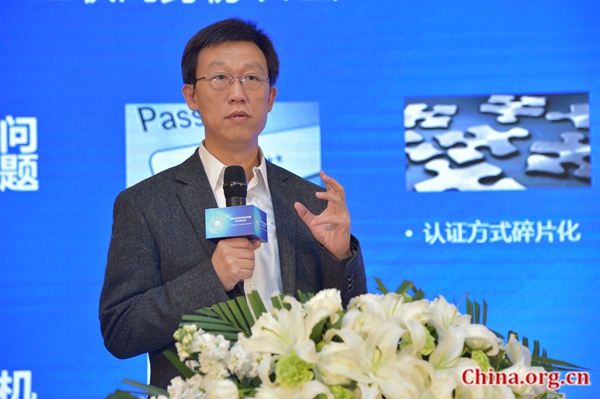Lenovo spinoffs business dedicated to online authentication
- By Guo Yiming
 0 Comment(s)
0 Comment(s) Print
Print E-mail China.org.cn, April 28, 2016
E-mail China.org.cn, April 28, 2016
|
George (Zhiqiang) He, senior vice president at Lenovo and president of the Lenovo Capital & Incubator Group (LCIG), introduces LCIG's spinoff business aimed at online authentication at a symposium yesterday on trusted identity in cyberspace. [Photo provided to China.org.cn] |
China's tech giant Lenovo has created a firm dedicated to providing online authentication solutions that aim to push China's cyberspace security amid increasing risks of hacking, data breaches and identity theft, the company announced yesterday at a symposium on trusted identity in cyberspace.
Online Biometric Authentication Ltd, a subsidiary of the Lenovo Capital & Incubator Group (LCIG) under the Chinese PC and smartphone manufacturer, will work together with all stakeholders in the field to address the authentication problem and push application of international standards across the ecosystem, revealed Henry (Haixin) Chai, CEO of the new company.
"China is more extensively exposed to the mobile internet than any market in the world, and the traditional authentication methods of username/password combo can no longer meet users' demand for convenience, efficiency and safety especially in the ever expanding mobile internet," said Chai.
"That's why we want to provide more advanced technologies and solutions to end users through stronger online authentication methods based on FIDO standards," added Chai who chairs the China Working Group at Fast IDentity Online (FIDO) alliance that creates open standards for a secure and easy-to-use universal authentication, including biometric measures such as fingerprint and iris recognition, eliminating the world's dependency on password-based security.
The internet, especially with the rapid expansion of mobile and cloud computing, exposes users and enterprises to fraud more than ever before.
In 2015, China witnessed a greater amount of cybersecurity incidents in its territory, such as identity theft, online fraud and blackmail attributed to data breaches, as well as malware on the mobile internet, according to a latest report from China's National Computer Network Emergency Response Technical Team/Coordination Center.
President Xi Jinping has called for the comprehensive detection of internet risks to ensure online security at a symposium on cybersecurity on April 19, calling for the establishment of a system to protect information infrastructure in industries including finance, energy, telecommunications and transportation.
"Many businesses and government agencies around the world have a shared interest in improving online authentication to address the password problem," said Brett McDowell, executive director of the FIDO Alliance. "But the problem is too big to solve single handedly, and we must collaborate on a global scale."
Tan Tieniu, vice president of the Chinese Academy of Sciences and professor of computer vision and pattern recognition, agreed that it takes coordination across the industry and efforts from the policy, technical and standard level to fully address the problem.
Lenovo is one of the six founding members of the FIDO Alliance formed in 2013 aimed at developing technical specifications and promoting the adoption of standards.
It was the angel investor for biometric technology, Face++ and Nok Nok Labs, that addressed problems created by the reliance on weak or overly complex passwords. Lenovo also aligned with the Institute of Automation at the Chinese Academy of Sciences in pushing for core technology development, according to a briefing by George (Zhiqiang) He, senior vice president at Lenovo and president of the Lenovo Capital & Incubator Group (LCIG).
Online Biometric Authentication Ltd is the second spinoff of LCIG, formerly known as the Ecosystem and Cloud Services Group. The first incubator under LCIG was SHAREit, a popular cross-platform file transfer tool which now boasts 520 million users worldwide and ranks as the most downloaded app in Google Play in 16 countries and regions.







Go to Forum >>0 Comment(s)